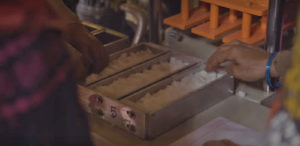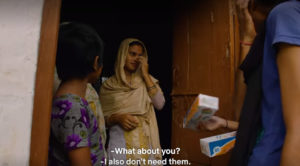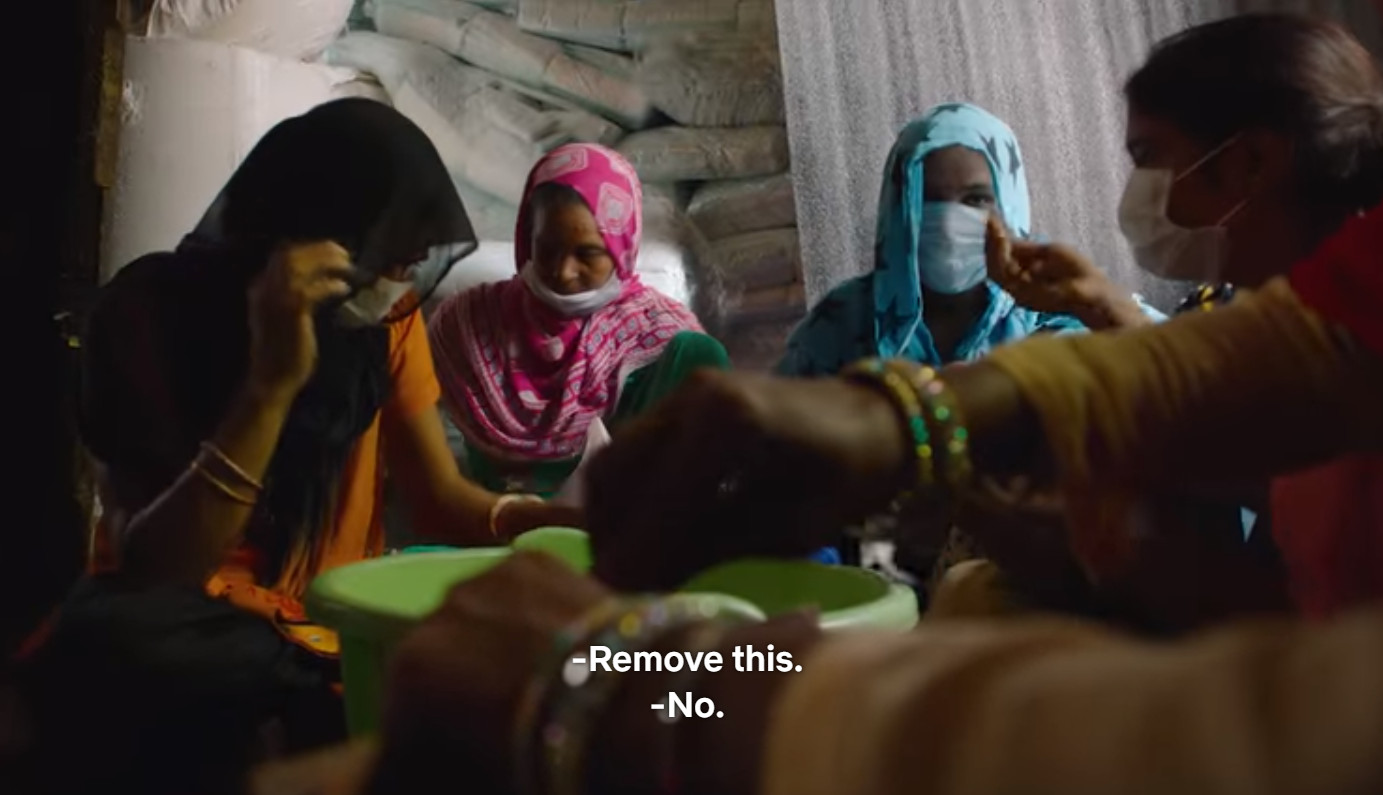A Netflix documentary nominated for the Oscars recorded the attitudes of Hapur girls, among others, towards menstruation
“We feel shy, we can’t say it.” This is the opening scene of Oscar-nominated Netflix documentary — Period. End of Sentence — directed by Rayka Zehtabchi. The teenaged girls of Hapur district, in this scene, feel uncomfortable in talking about menstruation. The documentary focuses on how the lost-cost pad-making machine has changed the lives of women there, who not only make the pads but also sell them to earn money.
Not all of them are able to comfortably and openly talk about this job with their family. “I have told them that I work in a factory that makes diapers for children. What else can I tell them?” says a girl, who is shown working in the factory.
“I have never heard about it,” a woman says in one scene where they are being asked about sanitary napkins. “I have an idea about it. But we don’t know where to get it or how to use it,” says another.
The sanitary napkin making machine is slowly changing things for this district, providing rural women with much-needed access to hygiene. But how much have things changed in urban India, where sanitary napkins are easily available? If accessibility is the only issue, then these areas should have a very healthy number of women who use sanitary pads.
The latest National Family Health Survey (NFHS) 2015-16 report shows that the use of sanitary napkins among Indian women is 48.5% in villages, 77.5% in urban areas and 57.6% total. In urban areas too, there are women who can’t afford sanitary napkins and some who still consider using a cloth better.

Prachi Jain, a 25-year-old Delhiite who is preparing for IAS, says that she does not use sanitary napkins as she finds using a cloth better. “People might find using a cloth dirty or unhygienic but I find pads extremely uncomfortable. I use proper cloth pieces that I keep washing and not dirty cloth rags or something. I am used to the cloth and I don’t think I can ever switch. It is not because I can’t afford it but it’s a personal preference.”
However, doctors and gynaecologist have time and again advised against using a cloth during menstruation. “The use of cloths during period increases the chances of infections and diseases. When women don’t have better or affordable options available, they end up using a cloth. But it is an extremely unhygienic practice that should be avoided,” says Ranjana Misra, a gynaecologist.
“By imposing taxes on sanitary napkins, these basic essential goods are being treated as luxury products. Menstruation is not a luxury, and should not be perceived as such. The installation of sanitary napkin vending machines in public toilets is also something that the government can implement for ease of access,” says Riddhi Sharma, a 26-year-old who works in an MNC. She adds that she too finds sanitary napkins expensive: “If I find it expensive, it is difficult to imagine that people who belong to the lower strata of the society would be able to easily buy it.”
A study revealed that about 43% of Indian women do not have access to sanitary essentials at the beginning of periods, while 36% felt uncomfortable in buying them with other customers around. Jyoti Kumari, an 18-year-old whose father is a rickshaw-puller, feels so shy that she finds it difficult to answer. After a lot of hesitation, she finally manages to talk and says, “We feel shy in talking about it. I have seen ads on TV, but I feel too shy to go to the market and buy a packet. My mother used to use a cloth, so I use the same.”
Asha Devi, a 46-year-old who works as a domestic helper in Noida, says, “How will we be able to buy sanitary napkins that cost so much? We earn little and we have to feed our kids and educate them. Buying a sanitary napkin will be at the bottom of the list for me.” Asked if she would ever like to switch if given an option, “I don’t know,” she says with a sheepish grin, “I have never used one. I am assuming that it if costs so much, it would be more comfortable. But why to think of something you can’t buy? Now we are used to it, so we don’t find it such a big deal.”

Not many have heard about low-cost sanitary napkins and feel that all the sanitary napkins are beyond their budget, so they can’t afford it. Some who know about it are too shy to go to the store and buy it. “How can we just go and ask for something like this at a shop? We don’t even say such things at home. How do I talk about it to a stranger?” asks Gayatri Singh, a 36-year-old who works as a sweeper.
“I dispose off the used one, but I can’t buy fresh sanitary napkins for myself. This is life. I can’t afford it and also once you start using a cloth, you get used to it. My mother told me to use a cloth around 15 years ago. That time, there was hardly any awareness and our financial condition was worse. So, I got used to the cloth. Now when I have used it all my life, it makes little sense to switch,” says Poonam, who cleans toilets.
No doubt attitudes are changing, but mindsets need to change not only at the rural level but also in urban areas. Lack of awareness, unaffordability and timidity of women in talking about menstruation also play their role in depriving women of this essential product.





